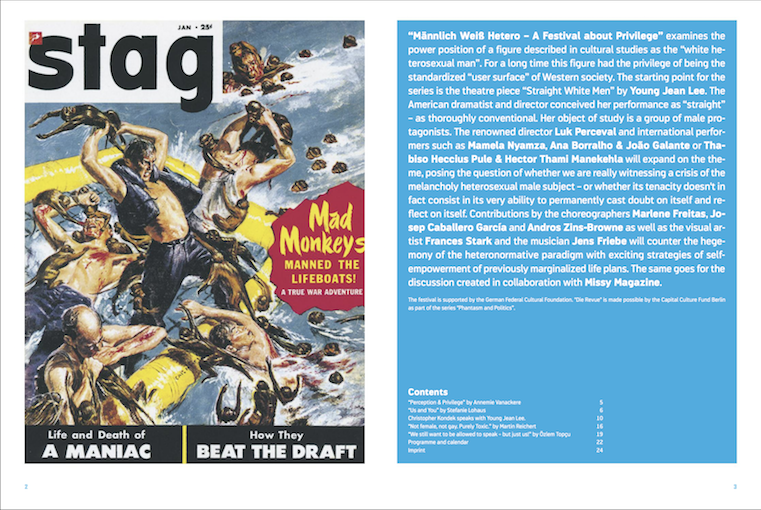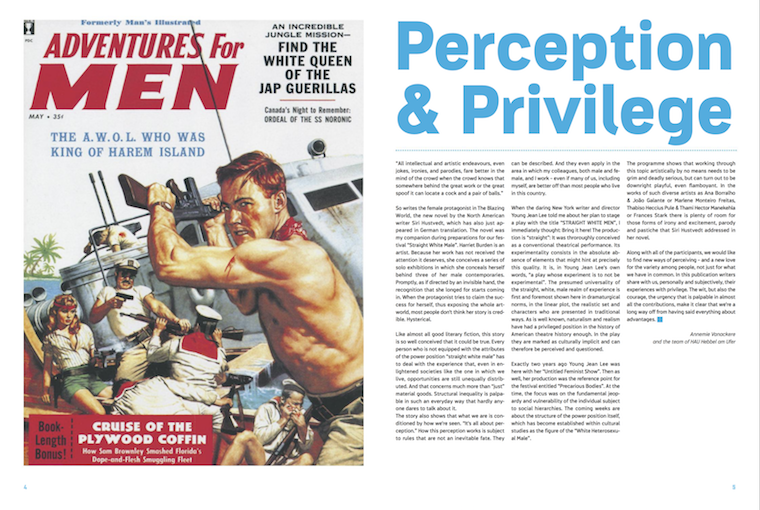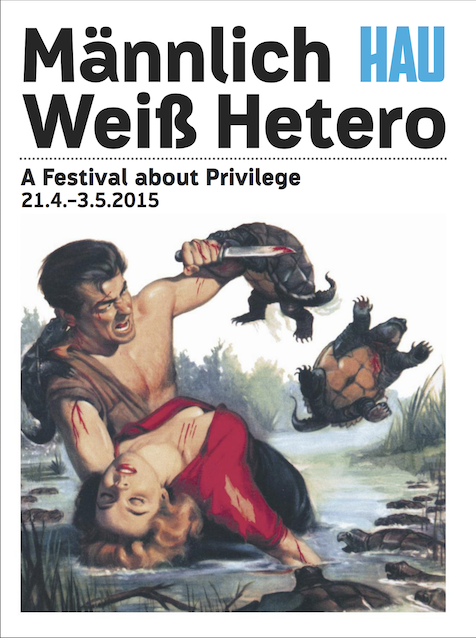Female Gaze
It was supposed to be the panel debate of the festival “Male. White. Straight.” Well at least, that was what Stefanie Lohaus, publisher of Missy Magazine, promised in her opening speech. She had invited three guests to discuss with them film excerpts in order to reveal the invisible privileges of the white, male, heterosexual world. But, hardly anything was said about the social construct “manhood / masculinity / maleness”.
Lohaus managed to lightly name some key points of the debate in her ten minute-introduction:
– a cultural definition of privilege, which highlights social status beyond legal privileges.
– that favouritism or discrimination accompany us from birth through a systematic bias in society and politics, which is in place despite article 1 of the constitution;
– that the keepers of privileges are usually unaware of them;
– that we are still far from equality of the sexes, religious communities or races;
– that we frequently tend to overlook Class and Non-Disability.
But when the actual debate was supposed to begin after a James Bond clipping, it became clear that the guests were neither attuned to each other, nor to the film excerpts, nor to talking about the topic in front of an everyday audience. As much as Racism, Sexism and Heteronormativity were supposedly “obvious” in the shown scenes, as much was the guests‘ lack of ability to break it down or contribute something substantial to the discussion. Or, maybe, they just could not communicate their ideas understandably. And, thus, you cannot blame any white, male heterosexual if he walks out of the room none the wiser.
 Introduction from the festival magazine.
Introduction from the festival magazine.
Chris Tedjasukmana is a film scholar who brilliantly analyses films whilst putting them in context with feminist theories, but unfortunately he was not as able to do this in his use of everyday language. Instead a completely academic vocabulary was exercised at a festival that is supposed to make privileges visible. This negligent attitude to communicate is fatal, because not everybody understands sentences like: “The ridiculisation of BDSM … with hierarchical role-categorisations … where the submissive part … shows the economisation of the Private …” And quite frankly, it is tiring to listen to. Why not: “Did you use bondage-sex in the movie to show that, despite the role swap, the woman remains financially dependent on the man?”
Amongst the panel was Tatjana Turanskyj, film maker of the movie discussed “Top Girl”, often found herself caught in a very unfortunate internal monologue. She was not quite as concise in her everyday comprehension of the abstract theories that were her understanding of the topic at hand. Her sentences tend to sound like ellipses in-between which she skips two sentences she has in mind. If you have read feminist, post-colonial and Critical Whiteness-theories, you might be fortunate enough to know what she is referring to. If not – good luck following her thoughts!
Apparently only Simone Dede Ayivi, perfomance-artist, did not seem to think this is a abstract-intellectual entertainment-show and had the tenacity to provide the audience with concrete clues about what makes privileges invisible, for example:
– Positive role models are almost exclusively portrayed as white people.
– Black people are being kept and portrayed in low social positions.
– Beauty ideals, male fantasies and projections about women are hidden everywhere; just as constructions of racial identities – in films, but also in language, culture and everyday realities.
– These images lay down how we perceive ourselves and others.
 Introduction from the festival magazine.
Introduction from the festival magazine.
Luckily, at one point, a deflated Simone briefly loses patience, when Fassbinder’s Angst essen Seele auf is being discussed as a film with a successful anti-racist message. Here, she made clear that the depiction of the Moroccan gastarbeiter (migrant worker) is unrealistic, has no empowering message, completely reflects the gaze of the white male and, thus, reproduces a stereotype once more. But when the curtain was briefly lifted for a genuine discussion … well, everyone else on stage was eager to appease and clarify misunderstandings, as if this was about maintaining their own reputation.
Facilitator Lohaus then rephrased one of the main questions of the festival, namely how ‘one‘ (especially the white, male, heterosexual One) can possibly do the right thing – if we cannot always do the right thing despite our best intention? And here too, Simone intervened, raising the claim that we should of course always demand from ourselves to do the right thing, to apologise for mistakes, once we have insight, and to incessantly see ourselves as learners. To begin with the assumption that we can not do everything right anyway, she said, was like having an excuse, which inevitably would hinder our commitment.
And here, after one hour and twenty minutes, the chance was missed again: to plug in and state some essential issues around privilege. Say for example, we might need to stop looking only at the intentions of agents, but more so to the impact on those affected by abused privilege. Because Racism is not a thrashing Nazi, but a perception pattern in our heads, an acquired structural blindness, a systematic historical amnesia – and this is true for other -isms as well. That the so-called equality of opportunities or the idea our social status was linked to our individual merit are complete myths, which allow those holding privileges to assume others are lazy or dumb – not systematically disadvantaged.
 Cover of the festival magazine.
Cover of the festival magazine.
That often the hazardous pivot in being privileged is (whether White, male, straight, rich, EU-passport owner, etc.) ignorance, in the literal meaning: abusive stupidity out of disregard or lack of knowledge. Knowledge, which is completely obvious to everyone else affected by exclusion:
– That we are being privileged or discriminated against 24/7 in matters from A through to Z.
– That this is not about guilt or shame of one’s privileged identity and that the White male is not in the pillory as an individual person.
– That this is about rendering visible where the so-called ‘average person’, or the ‘universal individual’ can only refer to the reality of a White, male, heterosexual person.
– Because everyone else always walks the world marked as belonging to this or that non-White, non-male, non-heterosexual category.
– And, that the means against ignorance are self-reflection, self-criticism and education. Know thyself!
But instead of saying any of this, Lohaus contributed a personally noted anecdote in which she switched from “native Americans” to “Indians so to say”, thereafter repeating this to emphasise that she is now deliberately using the term quote unquote, so to say. The shoddily rushed next next film excerpt made clear, what was once concealed, that nobody had properly prepared for a joint discussion here. In return, we learned that Chris is a fan of James Bond, Star Trek and Fassbinder, that Simone does not get anything critically substantial out of any of those three and that Tatjana likes to be concerned with sex outside of her film work as well. Additional confessions that alcohol had already been drunk, they were nervous and in a confrontational mood might have added to self-ironic entertainment. But it did not do the discussion, topic or objective of the event any favour. The interested reader, thus, is advised to have a look at Stefanie Lohaus’ written introduction in the festival programme.
__________________
Festival “Männlich, Weiß, Hetero”
21.4.-3.5. im HAU (Hebbel am Ufer), Berlin
back to posts!
